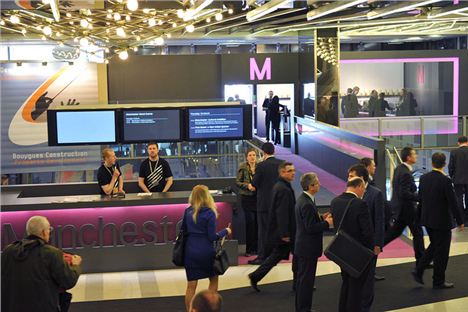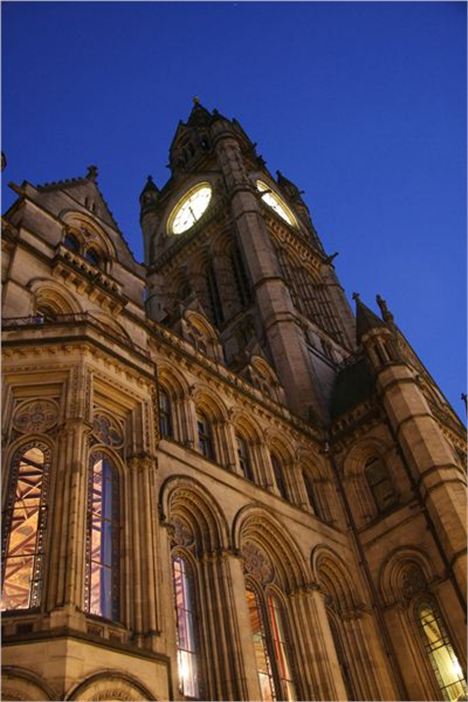SO I was off to Sir Howard Bernstein’s office in the town hall for a bit of a state of the nation chat before he heads to MIPIM this week to sell Manchester to the world.
“It makes sense to work alongside us, it makes things more effective”
The Chief Executive of Manchester (pictured above singing 'My Way' - or something like that) adores this annual property gathering, with its feast of meetings, bankers, developers, investors and dreamers. Not because it’s in the south of France and the sun usually shines but because it shows Manchester’s clout.
Out in Cannes, when you look at the UK, there is London and there is Manchester.
End of.
Forty five private companies are paying varying amounts from £5,500 to £20,000 to attach their own colours to the Manchester mast that hangs over the Croissette.
It’s slightly down on last year’s 49 but still an impressive family gathering.
I venture that the agenda for the twice daily presentations on the stand has a familiar ring. We heard about NOMA and First Street and Airport City and the science potential of The Corridor and Graphene in 2011. So what’s new?
“We said what we wanted to do last year and 12 months on we are delivering those projects,” says Sir Howard. “Despite very tough economic times we have made good progress.”
So the Co-op will be revealing its next round of investment opportunities, Ian Simpson will be talking about the design ethos for First Street, Felicity Goodey will explain Medi Park and David Partridge will be updating on Argent’s redevelopment of the Elisabeth House site.
But there will be new stuff.
I gather there could be a major announcement from Bruntwood about the Royal Eye Hospital development to kick off proceedings on Monday.
Plenty of reasons to be cheerful then and you can watch the stand events at 9.45am and 2.45pm live here which saves you the price of the flight and a ticket into the Palais.
While Sir Howard is upbeat about Manchester’s potential to deliver he acknowledges the uncertainty of global markets and says: “It’s a difficult time and its going to remain tough for the next two to three years. “
The recent announcement of extra Greater Manchester investment, a local authority pot with £100m to invest is an indication of how the region intends to keep on doing business. The money will be dished out to viable projects not as grants but short term loans, repayable over two to five years, with the money going back into the pot.
 Manchester's stand at MIPIM 2011
Manchester's stand at MIPIM 2011
Crucially it’s got the backing of all ten local councils and will be used to lever in more investment to start projects deemed of regional benefit.
“I will be disappointed if the £100m from the public sector does not bring in another £400m from the private sector to fund a pipeline of work,” said Sir Howard.
“Money is not the problem. We are talking to the banks and we have to look at new investment models and change the way we manage risk.
“We are working with the Pension Fund to lever money in and mixing sites which are attractive with sites that are harder to develop.
“There has to be better links between the banks, the developers and the land owners to bring all the different aspects together and manage and share the risk of development.
“We have the finance for the right schemes but we have to find a better way of doing things.”
A similar approach is being taken with the property market with a council backed mortgage expected to be available by the end of the year and a new joint approach to development with the city releasing sites and appointing a developer to build.
He believes the Irk Valley could provide the city’s next wave of new housing describing the redevelopment of Collyhurst as: “a huge, huge regeneration project, one of the most exciting we have done for years,” despite being knocked back for HCA funding.
When it comes down to specifics he would like to see movement on the redevelopment of the retail park on Great Ancoats Street to create a more open access to New Islington and will be pressing owners Henderson Global Asset for progress during the week.
It goes without saying that he wants to see work start on the redevelopment of the London Road Fire Station and would like the city to be able to buy the Ramada Hotel site which is currently held by NAMA, the Irish bank formed to hold the more ‘toxic’ assets.
Developers still think Manchester has potential for more hotels with interest still around for the old DSS site at Piccadilly and the Theatre Royal building.
He is looking forward to the new tram line to Ashton opening this summer, there will be test runs soon apparently, and believes that Cross Street is absolutely the right cross city route.
He accepts though that traffic flow around the city needs addressing and that the inner relief route is under increasing strain.
He said: “I am not sure we can assume it can continue to serve the function it was designed to for the next 20 years.
“We need to address better options for people to by-pass the city centre. In the city centre transport plan we said that is what we would do and we need to prioritise that.”
Half an hour is up and we’ve not even mentioned Manchester City’s training campus, the BBC and Granada sites, Sharp2, Spinningfields or whether the new on-street parking strategy is generating more or less revenue for the city. Then there’s education and training and jobs and what he thinks of the new hospitality training academy being sited in Oldham rather than Manchester
What is clear is that everything that happens in Manchester comes across his desk first. “Do developers and investors have to work with the council to get things done?”
“It makes sense to work alongside us, it makes things more effective,” he said with a steely look in his eye. “Partnerships have been the key to Manchester’s development and remain one of its great strengths.”









